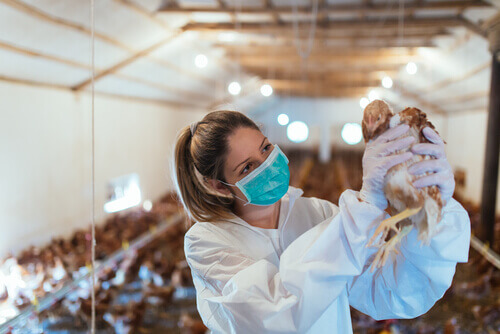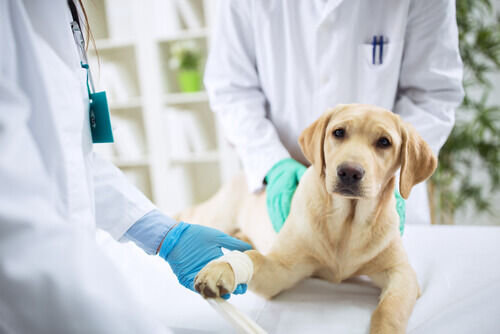What's the Scope of a Veterinarian's Work?


Written and verified by the vet Eugenio Fernández Suárez
What do veterinarians do?
A veterinarian’s work is without a doubt a crucial aspect of our care for our pet’s health and well-being. However, few people know everything that vets do on a daily basis and the fields they’re involved in.
Food safety
Many people are unaware that, among the things that veterinarians do, the review and analysis of the animal-based food that we consume stands out. That’s to say that every product you eat in your day-to-day life is usually reviewed by veterinarians. Even those that don’t come from cattle farms.
These professionals make sure that these foods are bacteria-free or free of other pathogens that could be harmful to our health. In addition, they even participate in the analysis of the water we drink. Thanks to the work that veterinarians do, we can eat much more safely.
A veterinarian’s work: inspection
Similarly, all premises that produce food or house animals are inspected by veterinarians. Among the tasks that veterinarians do in this case is the inspection of restaurants or any premises that produce or sell food. This guarantees that there’s no danger and that the regulations are complied with.
They also inspect places that house animals. Therefore, these professionals review and inspect farms, zoos, sanctuaries, or dog kennels to verify animal welfare regulations, among other important things.
The work of these professionals is so necessary that they’re usually the ones who establish various protocols related to hygiene and food safety that exist in all these businesses and even advise on allergen regulations.

Research
A large number of veterinarians dedicate their time to research, so they find out hundreds of new things every day. As a result, there are veterinarians who research drugs, food safety, vaccines, tumors, ecology, or animal production.
Animal health is closely related to human health, both in terms of animal-based food consumption and the presence of zoonosis. This is why a vet’s work stands out, as they collaborate with doctors and biologists when doing health research.
Animal production
Among all that veterinarians do, they must also help farmers improve their production and respect their livestock’s animal welfare. Thanks to their professional advice and preventive medicine programs, veterinarians are able to help improve production yields.
In addition, they’re responsible for planning reproduction through breeding and genetic improvement programs. They’re also in charge of producing all the feed used for this type of livestock.
Naturally, the veterinarian is also in charge of treating all the diseases that animals for slaughter may have. Generally, they do this through cooperative organizations that work with cattle breeders in a specific area, which means they have to travel hundreds of kilometers daily.
Conservation
These professionals also work with wildlife. Aside from zoo or sanctuary veterinarians, there are veterinarians who participate in numerous research and conservation projects with wild animals.
There are also veterinarians that devote their time to wild animal recovery. In this sense, both the GREFA wildlife hospital and the primatologist Rebeca Atencia, a veterinarian from Galicia, have recently received rewards from the Madrid College of Veterinarians for their work with chimpanzees in Africa.
Clinic
Although it may not seem like it, clinical work is just another one of the things vets do. Moreover, vets are in charge of treating and saving all the domestic and exotic animals we have as pets.

Although many people don’t realize it, this profession is one of the worst paid. That’s why we must remember that animals aren’t things, they’re a responsibility. As a result, we must take into account vet expenses before buying a pet, and not resent the vet’s fees.
Certainly, those of us who receive human public health services aren’t used to having to pay for an operation or a vaccination. However, data throws up a terrible truth: despite their low salaries, people haggle over prices with veterinarians, something we wouldn’t dare to do in the supermarket or at the cinema.
We hope you found this article interesting! As always, we recommend trusting your veterinarian’s work and to go to them if there is anything wrong with your pet. If you’re not sure how to help them, it’s better to be safe than sorry!
All cited sources were thoroughly reviewed by our team to ensure their quality, reliability, currency, and validity. The bibliography of this article was considered reliable and of academic or scientific accuracy.
De los Ángeles, M. & Asensio, F. (2008). ANIMALES MODIFICADOS GENÉTICAMENTE: (II): APLICACIONES. Biotecnología COVELMA. 64-73.
MCKENZIE A.I. & HATHAWAY S.C. (2006): Papel y actuaciones de los Servicios Veterinarios respecto de la inocuidad de los alimentos en toda la cadena alimentaria. Rev. Cient. Tec. Of. Int. Epiz. 25 (2), 837-848
García, O. R. (2019). Historia de la medicina veterinaria. Redvet, 10(5B), 1-4.
This text is provided for informational purposes only and does not replace consultation with a professional. If in doubt, consult your specialist.